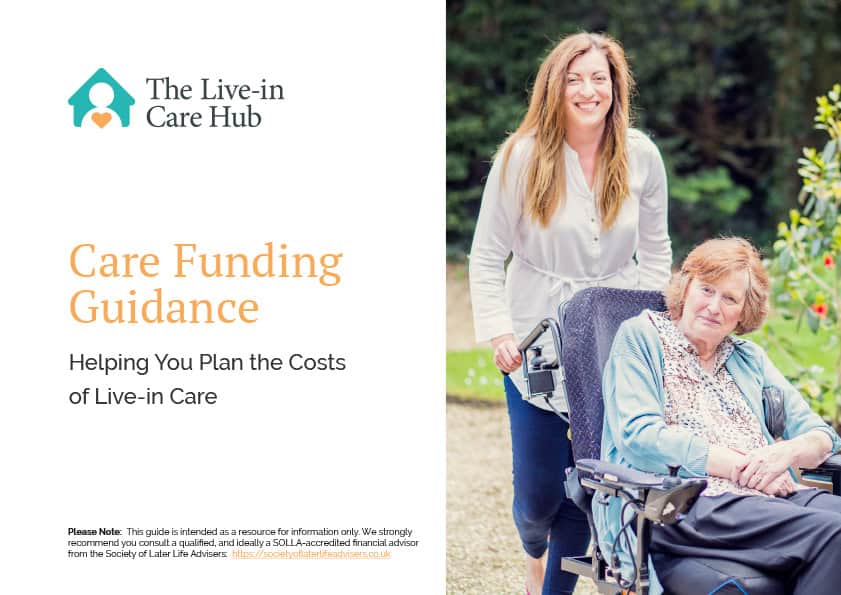Many people seeking care for themselves or family members can easily become overwhelmed with the financing options available including those from the State. On this page we aim to lay out and answer your questions as simply as possible about paying for care at home. Contact us here at the Live-in Care Hub by email at hello@liveincarehub.co.uk if you have any questions that aren’t covered here, or if you want to discuss any aspect of live in care and paying for care at home in more detail.
Paying for Care at Home
If you like the idea of staying in your home with live-in care 24/7, you probably have one key question: How will I pay for my care at home?
With a cost comparable to many residential care homes, live-in care could be more affordable than you think...
State funding
These are the main ways in which government funding can be used to fund live-in care:
In the UK at present, social care is means tested. In England and Northern Ireland if the person needing care has assets over £23,250 they must pay for their care. However, if you intend to continue living in your home (rather than moving into a care home), your home isn’t considered amongst the assets that are assessed. In Wales the threshold is £24,000 for care at home or £50,000 for care in a care home. In Scotland the threshold is £27,250, with personal care and nursing care free, but councils have discretion to charge for other services.
The route to understanding what a person needing care may be entitled to is to request a Needs Assessment from the person’s local authority : https://www.nhs.uk/conditions/social-care-and-support-guide/money-work-and-benefits/when-the-council-might-pay-for-your-care/. This means that the person’s local council will assess the person’s financial situation and let them know what they are entitled to from them (if anything).
The local authority will then develop your care and support plan based upon your needs, and administer the budget in either a direct payment, whereby you can source and arrange live-in care of your choice, or by way of the authority sourcing and arranging your care for you which will often be a domiciliary (hourly) care service which the family may not deem adequate.

For an individual who has significant health needs, the other publicly-funded option is an assessment for NHS Continuing Healthcare (CHC) https://www.nhs.uk/conditions/social-care-and-support-guide/money-work-and-benefits/nhs-continuing-healthcare/. NHS Continuing Healthcare isn’t means tested, but in order to be awarded the funding, the person needing care would be required to go through an assessment of personal and medical needs which is scored using points.
People who believe they should qualify for NHS Continuing Healthcare funding often find that the assessment doesn’t grade their health needs as sufficiently significant to qualify for funding, however, if you or your relative does meet the criteria your care will then be funded entirely by the NHS.
NHS budgets are typically higher than those available to local authority social services which continues to be underfunded by the Government currently. This may change with increasing political pressure being applied.
Personal Independence Payments
The person needing care may be entitled to claim benefits to help pay for their care. For example, if the person is under 65 years old, they could apply for a Personal Independence Payment (PIP) https://www.gov.uk/pip.
Council Tax Reduction
A person with a diagnosis of dementia may be able to reduce their Council Tax liability. More information on this is available from the Alzheimer’s Society https://www.alzheimers.org.uk/get-support/legal-financial/council-tax-dementia.
Attendance Allowance
Attendance allowance aids with extra costs if you have a severe enough disability that means you need care assistance. The level of allowance available depends on the level of care you require.
You could be entitled to between £59.70 and £89.15 a week to help with personal support if you’re of :
- state pension age or older
- physically or mentally disabled
Funding live-in care privately
These are the main ways in which live-in care can be privately funded, as recommended by us at the Live-in Care Hub:
If you have sufficient income, and/or savings, and/or investments this is an option that may suit you/your family. In the case of savings, with interest rates being very low at present your money won’t be growing significantly.
- Increasingly, and more accurately known as a ‘Lifetime Mortgages’. This is where major insurance companies including Aviva and Legal & General lend cash, (typically through specialist intermediaries who are authorised by the Financial Conduct Authority (FCA) to provide advice), which can be used for any purpose including the funding of 24/7 live in care, secured against the value of your home. The annual interest on the loan can either be serviced every year annually (simple interest) from the capital borrowed or from other sources, or allowed to roll up (compound interest). In the case of the former, the original loan, or in the caser of the latter, the original loan plus the interest on it, is settled up by your estate at the end of your life, or both your lives, which will reduce the value of your estate for the purposes of inheritance tax (IHT). Whilst you and your spouse are guaranteed to stay in the home for the whole of your lives, the roll up of higher interest rates in the past has sometimes meant the home was ‘lost’ to the next generation. This is less likely to happen now that typical annual interest rates are down to 2.5% on average, and the option to service the debt every year has now been mandated by the FCA.
- The Live in Care Hub has reviewed the whole of the Equity Release / Lifetime Mortgage market and following this analysis have concluded that we will work in partnership with Responsible Life https://www.responsiblelife.co.uk/ which has a broad range of funding options available to you. This link will take you directly to a page with further information on Equity Release with Frequently Asked Questions answered by Responsible Life and also to their Equity Release calculator.
- There are other ways to utilise some of the value of your home too, which may include downsizing and using the spare capital to fund your care. Alternatively making an arrangement with family to provide the capital that you need. You can also approach your bank for a secured loan against your assets.

You could purchase an annuity which is a form of insurance policy based on an actuarial calculation of your life expectancy that provides a consistent income in exchange for an upfront lump sum investment. When they are used for long-term live-in care, they provide a fixed income for life to fund care costs. A key point with annuities is to select the right product so that you are likely, at the very least, to get back in income the capital used tobuy the annuity in the first place.
Key points about funding live-in care
- Unlike residential care, where many people have to sell their family home today and then place the capital in a bank on low annual interest to fund living in a care or nursing home, you will continue to live in an appreciating asset over time, where priceless memories reside, and where you will continue to live as far as possible a normal life, inviting family and friends to visit in the usual way.
- For many people, the cost of live-in care is comparable to the cost of residential care, without theupheaval of leaving the familiarity of your own home. Live-in care is an even more advantageous option for couples who need long-term care in their home where one live in carer can usually cope with two clients.
- Research commissioned by the Live in Care Hub and independently authenticated by Kent University shows that health and wellbeing stays higher when remaining in the comfort and familiarity of your own home.
- Unlike residential care, many people who are paying privately pay more so that the provider can ‘top up’ what local authority funded residents pay. Clients of live-in care providers pay based on their care needs.
What is the best funding option for me/my family?
The choices you make to fund live-in care are entirely individual to you, your family and your circumstances. Many people may have more than one option to fund their care. At the live-in care hub, we would strongly advise discussing yours and your family’s circumstances with a trained and authorised independent adviser (IFA) authorised by the FCA to provide financial advice. Make sure you choose someone who is qualified to offer this advice and isn’t looking to sell you a specific product or service. The live-in care hub is full of impartial information and is vital in helping you to make an informed decision about your live-in care options.
Legal considerations
In conjunction with sourcing advice about funding care, a person needing care who is considered to have mental capacity should have all of the legal aspects of their affairs in order, an example of this could be a Lasting Power of Attorney (LPA) in place with trusted members of your family, and an up-to-date Will so that all of their future wishes about their care and finances are documented and carried out with the necessary advanced planning.
Additional sources of information
UK Government: https://www.gov.uk/government/publications/care-and-support-whats-changing/care-and-support-whats-changing
https://www.gov.uk/browse/benefits/disability
Age UK – Paying for Care: https://www.ageuk.org.uk/information-advice/care/paying-for-care/
The Money Advice Service – Paying for Care: https://www.moneyadviceservice.org.uk/en/categories/paying-for-care
Society of Later Life Advisers: https://societyoflaterlifeadvisers.co.uk
Which? – Financing Care: https://www.which.co.uk/later-life-care/financing-care
Responsible Equity Release: https://www.responsibleequityrelease.co.uk
If you need to pay for your care costs but don’t want to have to sell your home there are several alternatives depending on your financial situation and eligibility.
Care annuity
This is a form of insurance policy, known as a long-term care annuity, to provide a regular lifetime income to enable you to pay care costs for the duration of your needs. There are two options depending on whether you need immediate funding or deferred (future) funding. To arrange a care annuity you will need to speak to a qualified financial adviser.
Equity release
This scheme, more commonly known now as lifetime mortgage arrangements or home reversion plans, are offered by insurance companies to people who have equity in their home. They allow you to access some of the value of your home while still retaining ownership. The pros and cons of this are:
- Pros – provides funds for care costs without losing the house
- Cons – can come with higher interest rates and reduces the inheritance value of your estate
Renting out
You could consider renting out your home to generate income for care home fees. This comes with some disadvantages, namely that you would still be liable for the maintenance of the property and that there could be complications if your relatives want to sell the home.
If you wish to receive care whilst staying in your own home you could look into renting out a room. This could be through an informal arrangement with someone you know and trust implicitly or you can advertise for a tenant through an established route such as an estate agent.
Renting a room in your home comes with a set of rights and responsibilities for you and your tenant. You must also keep your property in good repair and a safe condition. There is more information on renting out a room here.
If you decide to rent out you should ensure that any rental income will cover your care costs.
Downsizing
Many older people live in houses which are too big and have become unmanageable. The solution is to sell the home and move into a smaller property. The advantages of this are:
- Cheaper utility bills
- Easier to clean and maintain
- A cheaper property will release equity
If you are lucky enough to live in a large home in a desirable area you will likely make a substantial amount of profit on selling. This can be used to pay future care costs. The disadvantage of downsizing may come if you are unable to find a suitable smaller property in the area you want to live in so it pays to plan ahead in plenty of time.
Other ways to fund your care costs depend on whether you have specific needs. If your care needs are health-related and long-term you may qualify for NHS Continuing Healthcare, which could cover your care costs in full following assessment.







